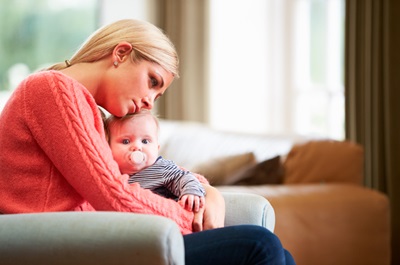 The American Psychological Association estimates that as many as 16 percent of mothers experience postpartum depression, and that percentage jumps to 41 percent among women who have struggled with this issue after previous pregnancies.
The American Psychological Association estimates that as many as 16 percent of mothers experience postpartum depression, and that percentage jumps to 41 percent among women who have struggled with this issue after previous pregnancies.
They may face depression, anxiety, fatigue, mood swings, increased irritability, overwhelmed feelings and even thoughts of harming themselves or their children. Women with postpartum depression may have all, some or just one of these symptoms. The condition is different for everyone, but that doesn’t make it any less serious.
In severe cases, a disorder known as postpartum psychosis develops, usually during the first week or two after birth. Mothers with postpartum psychosis experience hallucinations and delusions and may pose a threat to themselves and their children.
“For first-time mothers, postpartum depression can come as quite a shock,” says Jessie Prim, certified childbirth educator, who leads the postpartum depression support group at Texas Health Hospital Plano. “Some become disheartened or feel like they aren’t good mothers because of it, but that couldn’t be further from the truth. Postpartum depression is a medical disorder. There’s nothing wrong with women who have it. They just need help.”
Why Is This Happening?
No one knows exactly what causes one woman to experience postpartum depression and another not to. Doctors believe the rapid changes in hormone levels experienced after giving birth may be partially to blame. Outside factors such as stress from financial issues or emotional strain may also contribute to the problem.
“While families can do their best to prepare for the added stress of having a child, it’s impossible to totally prevent postpartum depression,” Prim says. “If you know you are prone to mood disorders, try to make sure you have a good support system in place before giving birth. That should include information for a mental health expert who can help if you do find yourself facing postpartum depression.”
Connecting to Help
Prim and other clinicians find that postpartum depression responds well to treatment once women are connected with appropriate care. There is no need to suffer and no shame in seeking treatment.
“New mothers should see a medical professional as soon as they notice symptoms of postpartum depression or postpartum psychosis,” Prim says. “We use counseling, medication and hormone therapy to resolve symptoms and help new mothers regain their joy in life, their relationships and their new children.”
If depression and anxiety have stopped you from living life to the fullest, call 682-236-6023 or email THRBehavioralHealth@texashealth.org and ask about our complimentary mental health assessment.
